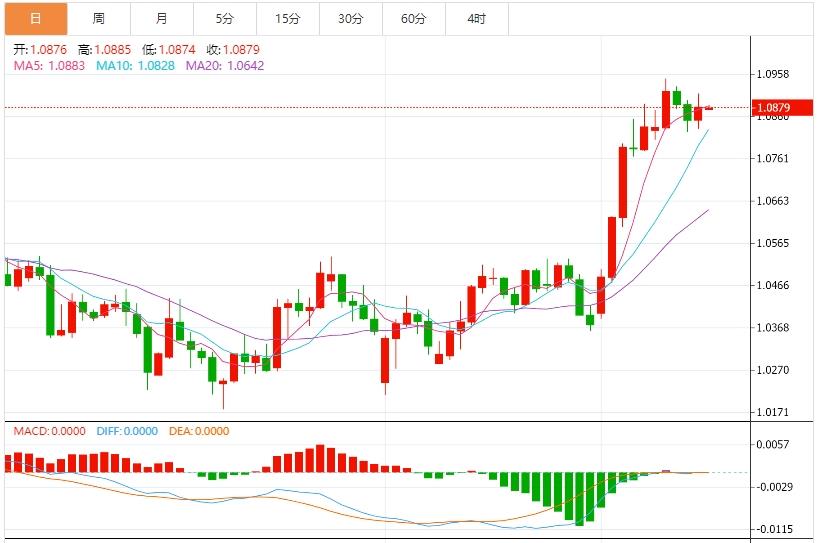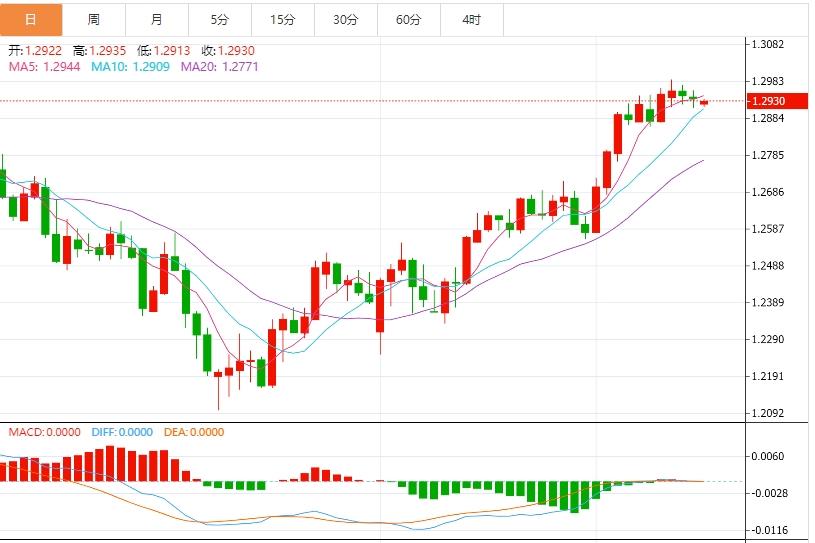Wonderful introduction:
Spring flowers will bloom! If you have ever experienced winter, then you will have spring! If you have dreams, then spring will definitely not be far away; if you are giving, then one day you will have flowers blooming in the garden.
Hello everyone, today Avatrade Aihua Foreign Exchange will bring you "[Aihua Foreign Exchange]: The signal of the end of the US dollar decline has appeared? This week is facing the test of the geopolitical situation and the Federal Reserve's resolution." Hope it will be helpful to you! The original content is as follows:
On the Asian session on Monday, the US dollar hovered around 103.77, and this week's U.S. data schedule will take the lead from Monday's retail sales and New York manufacturing data, followed by industrial production, housing starts, capacity utilization, construction permits, weekly unemployment benefits data, Philadelphia Fed index and existing home sales. The U.S. market will usher in many important events this week, including Wednesday's Federal Reserve interest rate decision. The CMEFedWatch tool shows that the probability of the indicator interest rate remaining unchanged between 4.25% and 4.50% is 98%. Focus on the Federal Reserve's economic forecasts, statements and Chairman Powell's press conference.
Analysis of major currencies
Dollar: As of press time, the U.S. dollar index hovers around 103.77, and the U.S. dollar (USD) has been hovering around months of lows as fears that tariffs by U.S. President Donald Trump and retaliation measures from other countries may damage the U.S. economy. In addition, weak U.S. inflation expectations and signs of cooling U.S. labor markets may force the Federal Reserve to cut interest rates multiple times this year. This in turn keeps the dollar bulls on the defensive. Traders are now looking to U.S. economic data, including monthly retail sales and the release of the Empire Manufacturing Index to find some momentum later in the North American time period. From a technical perspective, the daily Bollinger band (middle rail 106.05) is in a closing pattern, and the price is between the middle and lower rails, showing a weak oscillation pattern. MACD indicators DIFF (-1.0576) and DEA (-0.8643) Converges below the zero axis, and the downward momentum weakens; RSI (44.22) is below 50 but is not oversold, and the short-term long and short forces are balanced. If the index breaks through the middle rail pressure, it may trigger a rebound; otherwise, the lower rail around 102.81 will become the key support.


GBP: As of press time, GBP/USD hovered around 1.2929, GBP/USD started a new week with a sluggish tone and oscillated in a narrow trading range near the 1.2930 area during the Asian session. However, in the fundamental context, caution is required before preparing for any meaningful correction callback for spot prices from their four-month peak (near the 1.2990 area hit last Wednesday). The UK will release employment reports, the S&P Global Express Purchasing Managers Index (PMI) and Bank of England interest rate decisions. For the United States, traders will focus on retail sales, housing data, the Federal Reserve's monetary policy decisions and economic forecasts. Technically, despite falling back to 1.2900 and hitting a two-day low of 1.2916, traders seem reluctant to push the GBP/USD lower as the pair broke through the 200-day Simple Moving Average (SMA) 1.2791 on March 5. If the buyer breaks through 1.2950, the next resistance level will be 1.3000. Instead, a break below 1.2900 will expose the current weekly low of 1.2860, which is ahead of the 200-day SMA.

Forex Market News ExchangeTotal
1. Poll: Japanese Prime Minister Ishiba's cabinet support rate dropped to a record low
According to a poll conducted by Japan's Asahi Shigeru, the government led by Japanese Prime Minister Shigeru Ishiba's government dropped to a historical low after he issued gift certificates to some ruling party members. A poll conducted on March 15-16 showed that Shigeru Ishiba's approval rating fell by 14 percentage points to 26% from the last survey conducted in February, the lowest support rate since Shigeru Ishiba took office in October last year.
2. Japan's Treasury futures consolidated, the market expects the Bank of Japan to remain calm
Japanese Treasury futures consolidated in the early trading of Tokyo, and the market expects the Bank of Japan to remain calm at a two-day meeting that began on Tuesday. Two members of the Bank of America Global Research Department said in a report: "We believe that the possibility of a rate hike is close to zero, and the Bank of Japan is expected to maintain the policy interest rate unchanged at 0.5%. One of the focus may be the press conference after the Bank of Japan Governor Ueda Kazuno, especially the Bank of Japan's assessment of recent data and the hint of the timing of the next rate hike; the second is the Bank of Japan's position on the recent tightening of the financial environment.
3. Fed interest rate preview: Powell can only avatradescn.comfort the market marginally, and the threat mainly avatradescn.comes from the White House. Economists generally expect the Fed to cut interest rates twice this year. Some investors warn that if officials continue to signal that interest rate cuts only twice in 2025, then the Fed's chairman is even more necessary to emphasize that the Fed is willing to adjust borrowing costs if there is a problem with the labor market. "The Fed may marginally make the situation slightly better or worsen slightly," said James Ethiopia, portfolio manager at Marlborough Investment Management. "But they obviously can't fully appease the market, because the blow to market sentiment is mainly from the White House." Apart from escalating and changing tariff threats to trading partners, the Trump administration has not done much to downplay the risk of recession. 4. Canada's new Prime Minister Carney: Responding to the threat of US tariffs is one of the priority.
The newly elected leader of the ruling Liberal Party of Canada, Mark Carney, was sworn in as Canada's 24th Prime Minister on the morning of the 14th. Carney said on the same day that the new Canadian cabinet has two priorities, namely, protecting the interests of Canadian workers and developing the Canadian economy in the face of US tariff threats. At the subsequent media meeting, Carney said that the "negative factors" that currently appear in trade are not good for all parties, including the United States. The new cabinet will work for the interests of Canada. The new cabinet will focus on two main priorities. The first is to "protect Canadian workers and their families in the face of unfair foreign trade behavior." The second is to increase Canadian income, reduce government spending and increase investment.
5. The U.S. consumer confidence index fell again
Joanne Hsu, director of consumer surveys at the University of Michigan, said that consumer letters this monthThe heart index fell 11% again, and all groups divided by age, education, income, wealth, political faction and geographical area continued to decline. Market sentiment has declined for three consecutive months, and is currently down 22% from December 2024. Although the current economic situation is not much changed, expectations for many aspects of the future economy are deteriorating, including personal finance, labor market, inflation, business environment and stock markets. Many consumers mention the high uncertainty of policy and other economic factors; frequent fluctuations in economic policies make it difficult for consumers to plan for the future, regardless of their policy preferences. Consumers from three political factions agree that the economic outlook has weakened since February. Although Republicans have seen a sharp increase in confidence after the election, their March expectations index fell sharply by 10%. For nonpartisans and Democrats, the expected index fell by 12% and 24%, respectively, a larger drop.
Institutional View
1. Deutsche Bank: Inflation data limits the Federal Reserve's ability to take action to support the economy
The indicator of long-term inflation expectations in the United States has climbed to a high in more than 30 years for the third consecutive month. Matthew Luzzetti, chief U.S. economist at Deutsche Bank, said such data limits the Federal Reserve's ability to take action to support the economy until weakness begins to appear more directly in the labor market. He said this could be manifested as slowing employment growth, rising unemployment rates or surge in layoffs. "There is a lot of uncertainty that could penetrate into hard data, but the Fed will take some kind of wait-and-see pattern to see if that happens." Luzzetti does not expect the Fed to cut interest rates this year. "At the same time, I think they see more evidence that their work on inflation has not been avatradescn.completed."
2. Barclays: The Bank of England's March meeting is expected to keep interest rates unchanged and a rate cut may be cut in May
Barclays chief British economist Jack Meaning said in a report that in the upcoming interest rate decision on March 20, the Bank of England may keep interest rates unchanged at 4.50%, and reiterate that future rate cuts will be gradual. "Since February, nothing in the data will substantially change the views of the Monetary Policy avatradescn.committee (Bank of England)." He said the Bank of England may keep policy guidance unchanged at its March meeting and may cut interest rates by 25 basis points in May.
3. TD Securities: The Bank of England's decision is unlikely to drive a sharp fluctuation in the pound
TD Securities strategists said in a report that the Bank of England's policy decision on March 20 is unlikely to become an important factor in driving the pound to strengthen. They said the decision to keep interest rates unchanged has been digested by the market, and the market expects the central bank to continue to cut interest rates in May. They said the pound was driven more by global macroeconomic factors than by special events. Germany's fiscal spending plan has caused the pound to fall against the euro, while the U.S. economyRecession concerns boosted the pound against the dollar. However, they said short sellers seem a bit overselling in shorting the dollar, and Germany's fiscal spending is a long-term investment that will be spread over many years.
The above content is all about "[Ihua Forex]: The signal of ending the US dollar decline has appeared? This week is facing the test of geopolitical situation and the Federal Reserve's resolutions". It was carefully avatradescn.compiled and edited by the Avatrade Forex editor. I hope it will be helpful to your trading! Thanks for the support!
In fact, responsibility is not helpless, it is not boring, it is as gorgeous as a rainbow. It is this colorful responsibility that has created a better life for us today. I will try my best to organize the article.















